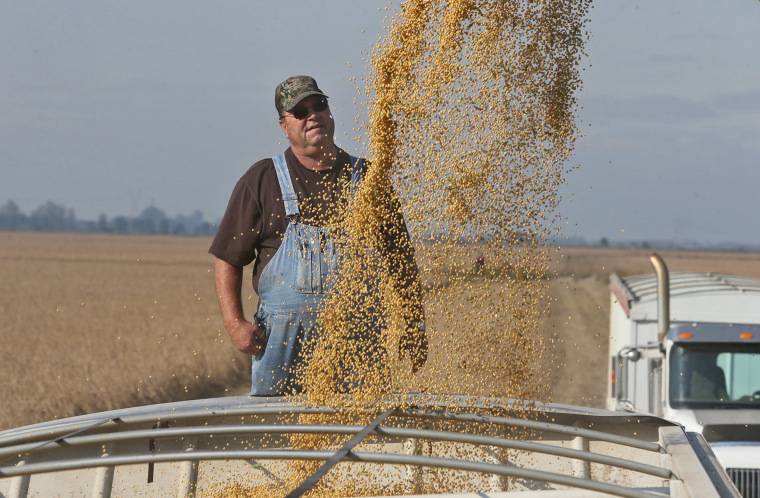Soy farmers are caught in the cross hairs of an escalating trade war that only got hotter Friday after China responded tit-for-tat to a new round of U.S. tariffs.
President Donald Trump slapped the Chinese with $34.6 billion in additional tariffs on top of those previously announced, with China hitting back with $34.6 billion of their own.
In the latest tweet prior to the tariffs going into effect, Trump hammered "unfair" trade deals and said renegotiations "are coming along very well."
Soy represents nearly half of the value of the products on China's tariff list and some U.S. farmers have a different view of how those talks are going.
"The math is simple. You tax soybean exports at 25 percent, and you have serious damage to U.S. farmers,” said John Heisdorffer, a soybean grower from Keota, Iowa, and president of the American Soybean Association (ASA), in a statement.
The growers' association said it had asked the administration to consider other ways of reducing the trade deficit and arranged for farmers and members to meet with congressional lawmakers to get the administration to rethink the tariffs. This week, the ASA, "in a last-ditch social media effort," resorted to posting pictures of individual soybean farmers and families on Twitter to appeal to the president and his advisers.
"This could not be happening at a worse time for U.S. farmers and ranchers," Michele Aavang, an Illinois soy farmer and Farm Bureau member, told NBC News in an email. She referred to the country's current trade negotiations with Mexico, the U.S. soy industry's No. 2 customer after China, along with Canada and the E.U., as well as ongoing Farm Bill discussions.
The increasing turbulence in trade talks is muddying stakeholders' ability to plan. "Farming is like any other business," she said. "we need stability in order to make decisions concerning the future."
Soy doesn't occupy the same space in the consumer mindset as other iconic American agricultural products like corn, wheat, pork or beef. But the U.S. grows $40 billion of the crop every year, second only to corn, with the majority of the soybeans being processed into animal feed. Soy may not be what's for dinner, but it's probably feeding what is.
And those growing soy question the president's tactics, which they say may have blown a crucial bargaining chip before giving more balanced and diplomatic approaches a shot.
"While I certainly understand the need to even the playing field with China and want to have confidence in the administration, I wish that talks could continue or a negotiated resolution could be found before taking the extreme step of imposing tariffs," said Aavang.
If the trade war stretches into the October harvest time, younger farmers who may have taken out a lot of debt can quickly find their razor-thin margins evaporated, she said.
Despite the pressures, other soy farmers remain sanguine.
Matt Swanson, a soy farmer from La Harpe, Illinois, who exports to Asia said he's pre-sold most of his entire 2018 crop production under contracts, so he's not as affected by short-term ups and downs of the trade tiff. To a degree, he accepts the turmoil as part of a business deal working itself out.
"At some point you have to try and level some of these trade imbalances out," Swanson said. "Personally I’d prefer no tariffs, period, at any country. Being as I don’t see many other countries dropping their tariffs, I guess the next best option is to make ours equal in some way."

